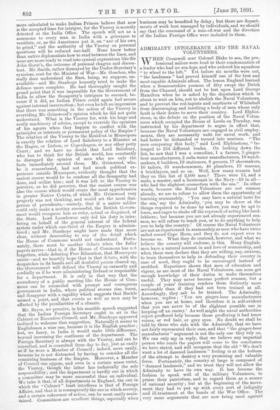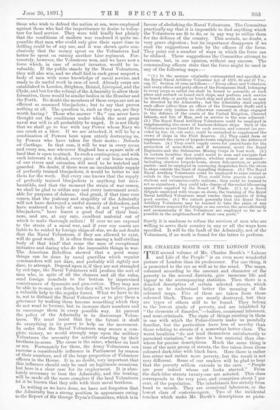questions will be reduced one-half. None know better ADMIRALTY INTOLERANCE
AND THE NAVAL none are more ready to read into cynical expressions like SirWHEN Cromwell sent Colonel Blake to sea, the pro- perceive, as he did perceive, that the easiest course was who had the slightest connection with the sea." In other also the course which would create the most apprehension words, because the Naval Volunteers are not seamen in greater Native Courts, of which Mr. Grimwood very already, we are to refuse to allow them the opportunity of properly was not thinking, and would set the most dun- learning seamanship. You may have a natural taste for gerous of precedents,—namely, that if a native soldier the sea,' say the Admiralty, 'you may be clever at the could. only make a mutiny successful, the British Govern- things required to be done by sailors, you may be apt to ment would recognise him as ruler, actual or disguised, of learn, and eager to shake off the reproach of acting like land- the State. Lord Lansdowne only did his duty in inter- lubbers ; but because you are not already experienced sea- fering on behalf of the general interest of the federal men, we will refuse to teach you, or to do anything to help system under which one-third of the Empire is adminis- you to help the country.' Of course the Naval Volunteers tered ; and Mr. Stanhope might have made that more are not as experienced in seamanship as men who have twice clear, without descending to any of the detail which sailed round Cape Horn, and they do not expect ever to the House of Commons would not understand. Fortu- become so. What they do contend, however, and what we nately, there must be another debate when the fuller believe the country will endorse, is this. Many English- papers arrive—that is, if the House of Commons has not men have a natural interest in and love of seamanship, and forgotten, while debating Free Education, that Muneepore when these men declare that they are willing, nay, anxious, exists—and we heartily hope that in that debate, with the to train themselves to help in defending their country in despatches in its hands and all doubtful points cleared up, ease of need, they ought to be encouraged instead of the Government will defend the Viceroy as earnestly and snubbed. Experience shows that men of education and cordially as if he were administering Ireland or responsible vigour, as are most of the Naval Volunteers, can soon get ascendency of a public meeting like the House of Corn- useful. They may never become perfect seamen, but a those who wish to defend the nation at sea, were employed against those who had the impertinence to desire to volun- teer for land service. They were told kindly but plainly that the conditions of modern war rendered it quite im- possible that men who could only give their spare time to drilling could be of any use, and it was shown quite con- clusively that the money spent on the Volunteers had better be spent on raising another Line regiment. For- tunately, however, the Volunteers won, and we have now a force which, in case of actual invasion, would be in- valuable. If the public stands by the Naval Volunteers, they will also win, and we shall find in each great seaport a body of men with some knowledge of naval service, and ready to do useful work in case of need. Already corps are established in London, Brighton, Bristol, Liverpool, and the Clyde, and but for the refusal of the Admiralty to allow their formation, there would be similar bodies in the Humber and the Forth. No doubt the members of these corps are not as efficient as seasoned bluejackets ; but to say that proves nothing at all. The question is, such as they are, are they worth having P Those who answer " No " can never have thought out the conditions under which the next great naval war will in all probability be waged, It is not likely that we shall go to war with any Power whose Navy we can crush at a blow. If we are attacked, it will be by a combination of Powers bent upon utterly destroying us, by Powers who have taken for their motto : Delenda est Carthago. In that case, it will be war in every ocean and every sea, war wherever England has a square mile of land that is open to attack. In such a contingency, and with such interests to defend, every piece of our home waters, of our rivers and estuaries, will need to be watched and guarded. No doubt, if there were an inexhaustible supply of perfectly trained bluejackets, it would be better to use them for the work. But every one knows that the supply of perfectly trained bluejackets is anything but inex- haustible, and that, the moment the strain of war comes, we shall be glad to utilise any and every instrument avail- able for purposes of defence. God grant, if that time ever comes, that the jealousy and stupidity of the Admiralty will not have destroyed a useful nursery of defenders, and have scattered a body of men who, if not yet "perfect bluejackets," have learnt a good deal of their busi- ness, and are, at any rate, excellent material out of which to make thorough sailors ! If ever we are exposed to the strain of a naval war, and if ever our coasts are liable to be raided by foreign ships-of-vkr, we do not doubt that the Naval Volunteers, if they are allowed to exist, will do good work. It is often from among a half-civilian body of that kind' that come the men of exceptional initiative and daring who do the impossible things in war. The American Rebellion showed that a good many things can be done by naval guerillas which regular commanders will not dare, and probably will rightly not dare, to attempt. Depend upon it, if they are not strangled by red-tape, the Naval Volunteers will produce the sort of men who, in spite of all the chances and all the rules, send foreign ironclads to the bottom by improvised contrivances of dynamite and gun-cotton. They may not be able to re-man our fleets, but they will, we believe, prove a valuable help to the regular forces. What we have to do is, not to disband the Naval Volunteers or to give them a grievance by making them become something which they do not want to become, but to increase their numbers and to encourage them in every possible way. At present the policy of the Admiralty is to discourage Volun- teers. We must insist that for the future it shall do everything in its power to help on the movement. In order that the Naval Volunteers may secure a com- plete victory, we would strongly urge upon the military Volunteers the necessity for actively standing by their brothers-in-arms. The cause is the same, whether on land or sea. Fortunately for them, the Army Volunteers can exercise a considerable influence in Parliament by reason of their numbers, and of the large proportion of -Volunteer officers in the House. It is, no doubt, very important that this influence should only be used on legitimate occasions, but here is a clear case for its employment. It is abso- lutely necessary to beat the Admiralty, and. the beating will be made all the more complete if the land Volunteers let it be known that they side with their naval brethren.
In writing as we have done, we have not forgotten that the Admiralty has a strong position in appearance owing to the Report of Sir George Tryon's Committee, which is in favour of abolishing the Naval Volunteers. The Committee practically say that it is impossible to find anything which the Volunteers are fit to do, or in any way to utilise them for the defence of the country. This sounds, no doubt, a very grave objection ; but its importance disappears if we read the suggestions made by the officers of the force. They point out a number of ways in which the force can be utilised. These suggestions the Committee attempt to traverse, but, in our opinion, without any success. The commanding officers state that the force might be used in any of the following ways :— " (1.) In the manner originally contemplated and specified in the Royal Naval Artillery Volunteer Act of 1873, 36 and 37 Vic., cap. 77. Section 16 runs as follows:—' Every officer and Volunteer, and every officer and petty officer of the Permanent Staff, belonging to every corps so called out shall be bound to assemble at such place and embark on board such ships, and perform such service on board ship, or partly on board ship and partly on land, as may be directed by the Admiralty ; but the Admiralty shall employ such officer (other than an officer of the Permanent Staff) and a Volunteer only (unless he otherwise consent) in ships engaged in the defence of the coasts of the United Kingdom, Channel Islands, and Isle of Man, and on service in the seas adjacent.' (2.) The Royal Naval Artillery Volunteers could be employed in supplementing the crews of harbour-defence ships. Such of the Volunteers as are found fit for such service, and consent (as pro- vided by Sec. 16, vide ante), could be embarked to supplement the crews of ships in the First Reserve. (3.) They could form or supplement the crews of torpedo-boats employed in the defence of harbours. (4.) They could supply crews for guard-boats for the protection of mine-fields, and if necessary, assist the Royal Engineers and the Submarine Mining Corps in boat work. (5.) In certain localities they could assist to man and navigate fast steam-vessels of any description, whether armed or unarmed— including obsolete torpedo-boats, steam fish-carriers, or private yachts—and be employed in conveying despatches from the shore to ships outside the limit of signalling distance. (6.) The Royal Naval Artillery Volunteers could be employed to some extent as reliefs to the Coastguard. They could form guards to signal- stations and submarine-cable stations ; they could be trained to act as signalmen ; they could take charge of the rocket life-saving apparatus supplied by the Board of Trade. (7.) As a Naval Brigade employed with troops on shore, the training of the Royal Naval Artillery Volunteers must render them capable of doing good service. (8.) We submit generally that the Royal Naval Artillery Volunteers may be trained to take the place of any naval forces removed for foreign or sea service, the more efficiently and economically if the Volunteers are employed so far as is possible in the neighbourhood of their own ports."
Surely it is madness to refuse the services of men who are willing to serve their country in any or all the ways here specified. It will be the fault of the Admiralty, not of the Volunteers, if no work is found for the latter to perform.



































 Previous page
Previous page